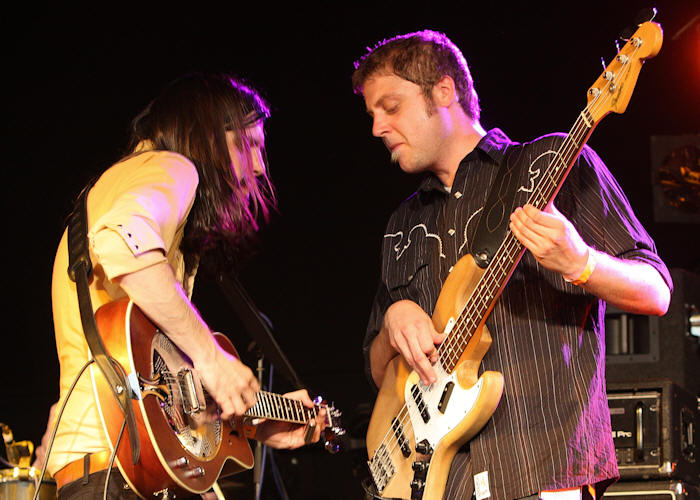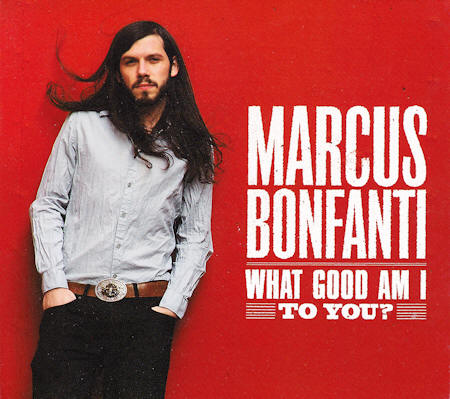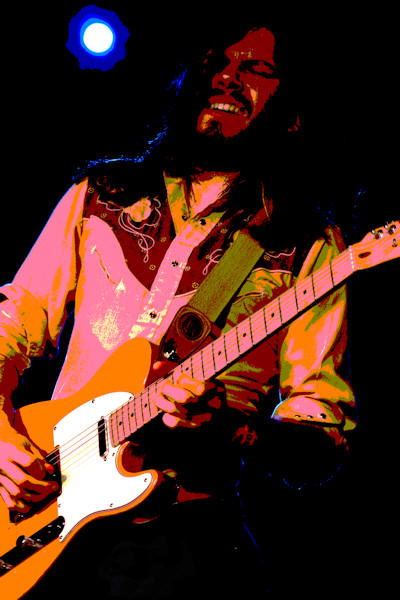
Painting © 2004 Loz
Arkle
Website
© Copyright 2000-2011 Alan White - All
Rights Reserved
Site optimised for Microsoft Internet Explorer



Early Blues Interview
|
|
Marcus: I’ve got quite a few. I remember when I was growing up at my Mum & Dad’s house, they had this big record player they got given by a friend of theirs when they first started setting up home. We didn’t have a TV but we did have this massive record player and my Dad had a killing collection of records. We had tons of Beatles stuff; Abbey Road and Sergeant Pepper were the two I remember playing over and over again: a Janis Joplin album called Pearl; and a couple of Chuck Berry records. Joe Cocker’s With a little help from my friends was one of my first albums. I re-bought it recently and I can still remember every word of every song. And then my Mum had loads of Joan Baez and Cat Stevens, Crosby, Stills & Nash, Neil Young – those were the kind of people I grew up listening to, and still do listen to. I’ve got so many memories of just sitting there and listening to those records over and over again. Alan: You’ve got an Italian Dad and an English mother. Were they musical at all? Marcus: Yes, my Mum’s guitar is the first guitar I really played on. I remember that when I was about 15 she brought it down from the loft one day and said, “Oh, I’d forgotten I had this thing” and that was the first guitar I’d ever really had a go on. I remember that the strings were 3 inches away from the neck and felt like the type of wire you used to cut cheese. She played piano as well and we always had a piano in the house and she’d have a little play now and then. My Dad was not a musician but a massive music lover, always had music on and just loved music. So it was always surrounding me even though we didn’t sit around and jam by a camp fire. It was still a big part of growing up. Alan: Did you always want to become a musician? Marcus: Yes, right from the word go. I started playing trumpet when I was six and my mum and dad always encouraged me to get a musical instrument, but a proper one! I started learning the trumpet and I was playing classical music in a big brass band. I used to love doing that. From that point I thought I wanted to be a trumpet player but I definitely wanted to be a musician. That was the only thing I could see myself doing until I was fifteen and then I picked up a guitar and, that was exactly what I wanted to be doing. That’s what girls like!
Marcus: Yes, I was lucky in that people are always telling me that they were discouraged by family or people at school telling me not to go into it but everybody I came across really encouraged me, from my primary music school teacher all through all my music teachers and also my parents. When I was 18 and just about to go off to uni to study music, my mum said “So, you’re definitely going to be a musician aren’t you? You’re not going to be a doctor or a lawyer?” I thought she was going to be disappointed but when I said, “Yes, that’s what I want to do and I’m either going to be a very rich musician or a very poor musician because there’s not really anything in the middle”, she was alright with it. It was the same with my younger brother because he’s a fantastic musician as well, he’s a bass player and between us we’ve encouraged each other to keep on going. Alan: You went to the Liverpool Institute of Performing Arts. Tell me about your experiences there. Marcus: It was an alright place. To be honest, and like most things, you get out of it what you put into it. And what I get out of it was that I met some amazing musicians and saw a lot of the guitar players around who were just fantastic players. I’d only been playing for about 3 years when I got there and I realised I really had to up my game and get with it and do some practice to even be able to jam with these guys. So that was great and I really worked hard on my guitar playing and then I wanted to get a blues band and start playing bars. And the good thing was that we had rehearsal rooms where we could rehearse and bars all around. The bad side was that when I was doing all that it wasn’t part of the course and they weren’t flexible enough to try and mark me on some of the other stuff I was doing. I was making money from it, I was being a professional musician so that’s where we fell out and I left. I just thought it was a little bit backwards in the way that the course was run. But I have other friends who went and did the whole degree (my bass player and harmonica player did the whole 3 years) and they’re doing the same thing, so it’s horses for courses.
Marcus: Led Zeppelin. That was one of the big turning points. I remember there was a kid at school, he was in a band and he had long hair and I thought he was cool as hell. His band were pretty scrappy but I really liked them. He said, “I think I know what you’d like. Go out and buy Zeppelin 4, the Doors' LA Woman and let me know what you think". I remember buying it at Our Price and putting it on the CD Player and thinking, “What the hell is this?”. My Dad never played me anything that heavy and when I heard Black Dog I’d never heard anything like that before but then I had to work out where that came from. You know what I mean? Like, how dare they?? Then I started going back through it and getting into all the blues stuff so it was basically through my love of Led Zeppelin that I traced back and thought, Who’s Willie Dixon? Why’s he credited on this when he’s not in the band. I need to find out who was, who Blind Willie Johnson was. And from then on there were just so many doors opening. You find one guy then you find another and you find they’ve done...whatever. It’s just endless. Alan: Your musical influences are quite varied. Who’s influenced you the most in your writing and playing? Marcus: Mmmm, errr, that’s tough because it does change. I get quite into stuff like I remember hearing Tom Waites about five years ago and then for the last five years Tom Waites has been the one thing I always seem to come back to. But I suppose it will come down to guitarists like Jimmy Paige and George Harrison. They were the two people that I heard play guitar that made me want to make a sound like that. Jimmy Paige because it can be so beautiful at times but then it can just be fireworks, it can be flamboyance, or beautiful blues playing and incredible licks. Then somebody like George Harrison – I think all of us could sing all his guitar melodies because they are just that memorable and beautiful. And as a song writer he’s fantastic and so is Jimmy Paige so I think I’d always come back to those two because they were the first people I got into.
Marcus: That’s a very nice quote. I don’t think I ever read that review. That’s brilliant – thank you! Oh, I don’t know. Because I was doing it solo for so long I really enjoyed the solo songs where I was doing the slower songs, more finger-picked kind of folky blues song, but at the moment I’m out with the band a lot and I really enjoy playing a good old screaming electric guitar. I think of everything you said there, the stomping blues stuff is the stuff I love the most – you know, Muddy Waters, Howlin' Wolf, bands like Grey Dee, Big Sugar. Right back to the early blues where it’s got that groove. At a certain time in that night when that goes on and you just want to break the place up. It’s just got that kind of momentum. Alan: How many guitars do you have? Marcus: I’ve just recently moved in with my girlfriend and she asked me what sort of place we were going to be looking for. I said, “Well, we’ll probably need two bedrooms” and she said “Oh, like for guests?” “No, I’ve got 15 guitars”. She’d only seen 4 of them because there’s really only 4 or 5 that I use a lot but I’ve never thrown a guitar away, never traded one in, never sold one. I’ve got the first Squire Strat I ever had, first Les Paul, first Les Paul copy. So I’ve got 15, in fact, no I’ve got 16 because I got a new resonator the other day and now I’ve got no money! Alan: Are there any particular songs you play which have special meaning to you? Marcus: Yes, I like 'What Good Am I To You' because I think it sums me up quite well. I’m quite a frustrating person to be friends with because I’m a bit, well, I’m very flaky when it comes to keeping to plans, picking up my phone and getting back to people. I just seem to be half-way between a gig all the time. So I wrote that song to just kind of apologise to a lot of my mates for hardly ever seeing them but luckily they are good friends and they understand. So whenever I play that one, I always think that it’s an apology. 'Sweet Louise' is always one that gets me because of the subject matter. It’s about a nightmare girl that I was with for a while and the only way to look at it was to write a song about it and try to cleanse yourself. And I like 'Hard Times' because it was one of the first songs I wrote and I thought, “You know what, I like that song and I think I might be good at this”, so I persevered because of that song. It’s full of lines that make me laugh because it’s all things my Dad used to say to me when I was younger and always in playing guitar and always out late at night playing gigs and he was always telling me, “You can’t just sit around the house playing guitar, you’ve got to get out there and earn money”. Now I am out there and earning money he’s a lot happier with me!
Marcus: Everything. Everything, it does, honestly. It’s just the way to get through life I find. You have an argument with someone and you feel blue. It’s an everyday life thing. I listen to the music and musically, lyrically, it seems to strike a chord within me and it makes me feel good and it makes me feel bad. It makes me feel happy and sad. It’s just a great way to look at life. Everyone always thinks that the blues is all about losing everything and being sad, but it’s not. It’s about humour, it’s about triumph over adversity which is what all the early pioneers of the blues did. I think it’s a beautiful genre of music. More people need to drop their preconceptions of what they think the blues is and sit down and listen to a Muddy record and laugh and cry. Alan: Tell me about the band. When did you get together? Marcus: The band has kind of grown, well, I don’t like the word organically but I don’t know another word for it. I started solo and I always had in mind my flatmate (until a month ago), Scott Wiber, the bass player, we’d played together for years and years and years, getting on for 10 years in different set-ups and I always knew that was the guy I wanted on bass for me. He’s the same, he loves the blues. He’s from Canada and he introduced me to loads of Canadian music as well so when I asked him to do it he was really up for it. Alex Reeves, the drummer, I met when I first moved back to London after living in Liverpool. He was Paddy Milner’s drummer and I depped a gig in Paddy’s band and got my ass kicked the entire night by all these incredible musicians! I love the way he plays, love the way he plays the blues and again we just chatted and it seemed like we had the same record collection, and again he was really up for it. Jake Field is the newest addition, he’s the harp player. I was in a band with Jake in Liverpool when I was about 19, we were in a New Orleans type funk band thing. I’d been waiting for him to move back to London and he did it about 6 months ago so as soon as he did I just snapped him straight up and said, “Please, play in my band. You are the missing piece of the jigsaw.” So now I’ve got this kicking four piece. Jake is also a fantastic piano player so he doubles up on keys. It’s brilliant. We’ve been away for the last four and five days and it’s just like being out with your mates. It’s like a holiday sometimes, everybody takes the piss out of each other and you get paid for it!
Alan: Tell me about the making of your new album, 'What Good Am I To You'. Marcus: It’s been a lot of fun. I’ve been writing the songs pretty much since I finished 'Hard Times'. I had a little bit of time because I didn’t tour relentlessly so there was a bit of time for me to write and I was also doing a lot of session playing out on the road with different bands and you find yourself with a lot of time just sat there with the guitar. So I started writing the songs for it with the idea that I wanted to do a band record. The first record was very stripped down and I did everything myself so this one had to progress, it had to be a bigger sound and show that I was going forward. So I wrote a lot of songs when I was on the road in the States with a guy called Finley Brown. He’s a fantastic song writer as well and the best thing is that since 'Hard Times' I’ve been lucky enough to work with some incredible song writers as their side man so I’ve just been learning off them. So it was great fun writing the record and then we basically got in for a week of rehearsals in London, we locked ourselves away for a week, really honed them down, I got their ideas in there as well because I didn’t want it to be a one-channel gig. Then we went in the studio in Tetbury and when we rocked up the guy who was to be our engineer, who I hadn’t met properly, was wearing mega bit t-shirt and these bright blue zebra skinned trousers. He was about six stone soaking wet, about 19, from New Zealand and he said, “Hello Mate. I’m your engineer”. I thought, “God” and said, “You do know we’re doing a blues album?” “Yeah, no worries, mate”. So we sat up the whole night listening to blues records and drinking and got on really well. He was just an incredible engineer and I honestly don’t think the album would have sounded as good as it does without him. He was just so up for experimenting. I’d just say, “Why don’t we try something like this?” and some more seasoned engineers would have just said, “That doesn’t work” but he was, “Yeah, let’s try it. Let’s put the bass amp in the gym and turn it right up and try to get that really echoey horrible sound”. He was great, always up for it. I had to send him to bed most nights. We’d start at 10 in the morning and finish at 5 in the morning. He’d still be at his desk but I’d be saying, “I’ve got to go to bed”. He was first in, last out and lived off macaroni cheese. It was fantastic – everybody in the same room. I was lucky enough to get it mastered again by John Astley who did the Stones, the Who. When I got to his studio he had masters for Bohemian Rhapsody sat on his piano. I said, “What’s that”, and he said “Yeah, I’ve had a good week. I’ve just been re-mastering Bohemian Rhapsody” like it was normal. He’s got all these big gold discs behind his sofa. He’s just a dude! And he put the finishing touches on the record – perfect! Alan: In November you are doing Carlisle Blues Festival again after you went down so well last time. Are you looking forward to it? Marcus: I really am. I had a blast last time. I’d never done a gig like that before and I was a little nervous because I was first on on the Sunday and I was like a little late addition because I was up there anyway with Earl Thomas and I think my manager probably blagged Nick pretty hard to let me on the bill. I didn’t really think anyone would be there and I’d just be playing as people were walking in. But there were 200 people there and everyone really seemed to love it. I really loved it. I had a great time. Alan: It was really memorable. Marcus: Thank you man. I won't forget that. I met some really lovely people and this year I’ll have the band with me and we’re going to really play stuff for people there. Everyone looked after me really well at Carlisle and because of that I really can’t wait to get there and thank everyone by playing a killing show and send everybody home happy. Alan: We are really looking forward to it. Marcus, thank you very much indeed. See you in November at Carlisle. _________________________________________________________________________
Album available from iTunes/Amazon Check out Carlisle Blues Festival details here Check out Marcus at Maryport Blues Festival
Return to Blues Interviews List
Website, Photos © Copyright 2000-2010 Alan
White. All Rights Reserved. |





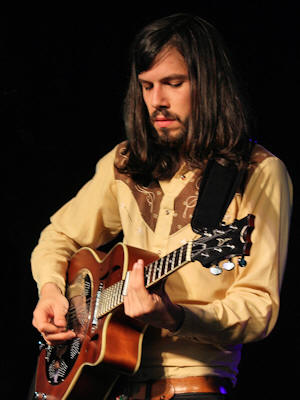 Alan:
What are your first musical memories growing up in London?
Alan:
What are your first musical memories growing up in London?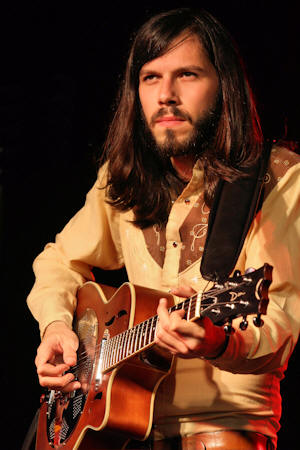 Alan:
So did you have any encouragement to be a musician from family or
friends?
Alan:
So did you have any encouragement to be a musician from family or
friends?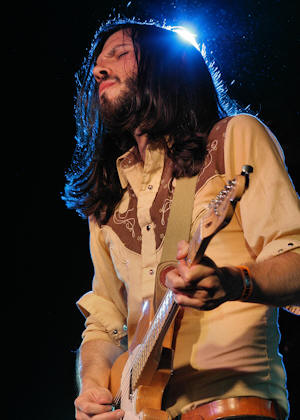 Alan:
What first attracted you to the blues?
Alan:
What first attracted you to the blues?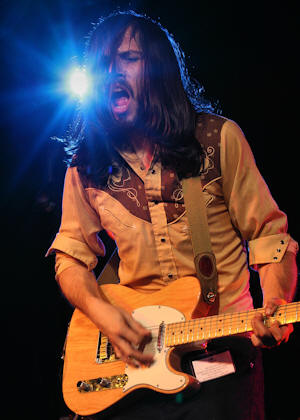 Alan:
I read a review which said you are “a wildly versatile
guitarist who can handle almost anything electric, country or folk-blues
from stomping blues to delicate acoustic finger picking”. Which
style do you enjoy the most?
Alan:
I read a review which said you are “a wildly versatile
guitarist who can handle almost anything electric, country or folk-blues
from stomping blues to delicate acoustic finger picking”. Which
style do you enjoy the most?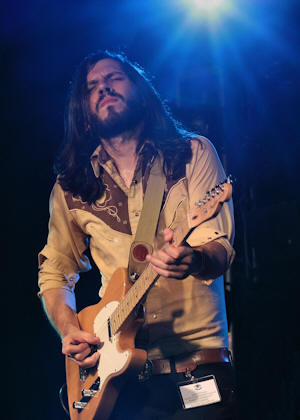 Alan:
What does the blues mean to you?
Alan:
What does the blues mean to you?